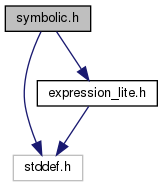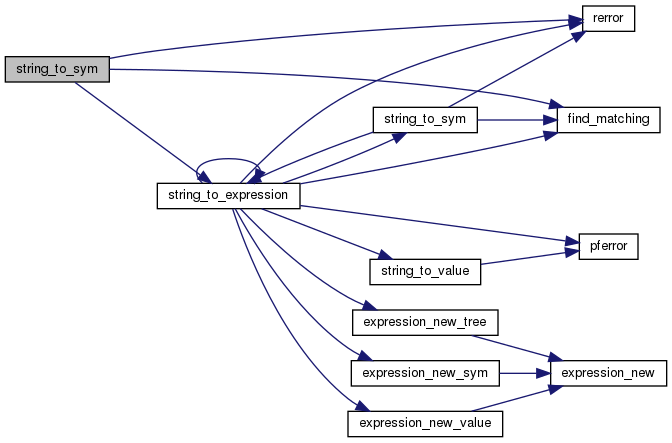symbolic.h File Reference
Include dependency graph for symbolic.h:

Go to the source code of this file.
Data Structures | |
| struct | sym |
| A named symbol type. More... | |
Macros | |
| #define | SYMBOLIC_NAME_SIZE 10 |
| #define | SYMBOLIC_P_STR_SIZE 16 |
Typedefs | |
| typedef struct sym | sym_t |
Functions | |
| sym_t | sym_new_name (char *name) |
| New symbolic object whose name is set to name. More... | |
| sym_t | string_to_sym (size_t src_str_len, char const *src_str) |
| Create symbol from a string. More... | |
| void | sym_to_string (char *dst_str, sym_t src_sym) |
| Generate a string from a sym_t. More... | |
Detailed Description
- Date
- May 3, 2014
A light structure that is mostly public access.
The point of the sym structure is to create a string based reference to an object without being directly connected to the object. This allows for
Macro Definition Documentation
◆ SYMBOLIC_NAME_SIZE
| #define SYMBOLIC_NAME_SIZE 10 |
◆ SYMBOLIC_P_STR_SIZE
| #define SYMBOLIC_P_STR_SIZE 16 |
Typedef Documentation
◆ sym_t
Function Documentation
◆ string_to_sym()
| sym_t string_to_sym | ( | size_t | src_str_len, |
| char const * | src_str | ||
| ) |
Create symbol from a string.
- Parameters
-
src_str_len The length of the actual buffer (not the number size). src_str The source string.
- Returns
- The symbol in the source string.
- Note
- Must have first char be digit
- Currently we only do Long Ints
< Used to explore the presence of a symbol parameter
Here is the call graph for this function:

◆ sym_new_name()
| sym_t sym_new_name | ( | char * | name | ) |
New symbolic object whose name is set to name.
- Todo:
- Should probably check that the name contains valid chars (printable)
◆ sym_to_string()
| void sym_to_string | ( | char * | dst_str, |
| sym_t | src_sym | ||
| ) |
Generate a string from a sym_t.
- Parameters
-
dst_str String to write to. src_sym Symbolic type to read from.
Here is the call graph for this function:

